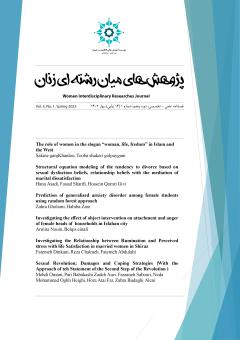The Role of Women in the Slogan "woman, life, freedom" in Islam and the West
Subject Areas :sakineh ganjkhanloo 1 , Tooba Shakeri golpaygani 2 *
1 - Doctoral student of Women's Studies, Tarbiat Modares University, Tehran, Iran.
2 - Assistant Professor and Director of Women's Studies Department, Tarbiat Modares University, Tehran, Iran.
Keywords: Islam, the West, woman, life, freedom, "Woman, Life, Freedom" slogan.,
Abstract :
The religion of Islam has always attached special importance to women, and in particular, there are many orders from Imams (peace be upon them) regarding women in religious texts and traditions. One of the important social matters today is the position and role of women in the family and society. In Islamic traditions, however, girls and women are mentioned as divine virtues, even though in Islam, God rewards good deeds, and consecrations are questioned by God. By looking through Islamic foundations, one may understand what a high position women had and still have in Islamic thought; however, it is the opposite in the West and the "Woman, Life, Freedom" slogan. Accordingly, the greater the commitment to Islam and Islamic life, the higher the continuity of life. On the contrary, the lower the commitment to Islam, the lower the mental peace and comfort of the person in the living environment and society. Moreover, the collapse of the Western system is based on unlimited freedom. This paper applies a diverse methodology to refer to written documents, computer systems, scientific software, and a descriptive and analytical data processing method. Furthermore, by referring to religious sources, the paper aims to study the role of women in the Woman, Life, Freedom" slogan "in Islam and the West. The results are that referring to the Qur'an examines the traditions, position, and role of women in the family and the "Woman, Life, Freedom" slogan in Islam, bringing tranquility contrary to the West.
1- قرآن کریم.
2- اسماعیلزاده، علی¬اصغر؛ و مصطفوی، سید رضا(1390). خانواده سالم و آموزشهای فرآموز. تهران: موسسه بین¬المللی پژوهشی فرهنگی هنری جامعه و فرهنگ.
3- تعدادی از نویسندگان. (1394). ویژگیهای یک دختر نمونه از نگاه اسلام. پایگاه خبرگزاری آوا. برگرفته از سایت https://www.avapress.com/fa/article/115880/
4- جعفری، محمد تقی(1386). شناخت انسان در تصعید حیات تکاملی. تهران: موسسه تدوین و نشر آثار استاد علامه محمدتقی جعفری.
5- دوانی، علی(1362). زن در قرآن. قم: بینا.
6- دهخدا، علی اکبر(1377). فرهنگ دهخدا. تهران: موسسه انتشارات و چاپ دانشگاه تهران.
7- سالاری¬فر، محمدرضا(1384). درآمدی بر نظام خانواده در اسلام. تهران: سمت.
8- عمید، حسن(1355). فرهنگ فارسی عمید. تهران: انتشارات امیرکبیر.
9- قمی، عباس(1344). سفینة البحار و مدینة الحکم و الآثار. قم: اسوه.
10- کدخدایی، حمیده(1395). عوامل استحکام خانواده در قرآن و روایات. سپاهان شهر: حوزه علمیه حکیمه.
11- کلینی، محمدبن¬یعقوب(1365). کافی. تهران: دارالکُتُب الإسلامیّه.
12- مجلسي، محمدباقر(1403ق). بحارالانوار لدرر اخبار الائمة الاطهار. بيروت: داراحياءالتراث العربي.
13- مطهری، مرتضی(1396). مساله حجاب. تهران: انتشارات صدرا.
14- مطیع، ناهید(1384). جامعهشناسی (مفاهیم کلیدی). تهران: آوای نور.
15- مکارم شیرازی، ناصر(1370). تفسير نمونه. قم: دارالکتب الاسلامية.
16- مشرق نیوز(1391). فرهنگ حجاب و عفاف اسلامي چگونه غرب را احاطه كرده است؟ برگرفته از https://www.mashreghnews.ir/news/126387/
17- نجفی یزدی؛ سید محمد(1396). اخلاق در خانواده و تربيت فرزند. تهران: سپهر.
18- نوری، حسن¬بن محمد(1408). مستدرک الوسائل. بیروت: مؤسسة آل البیت لاحیاء التراث.

